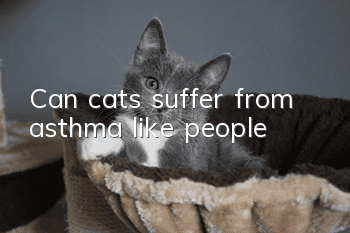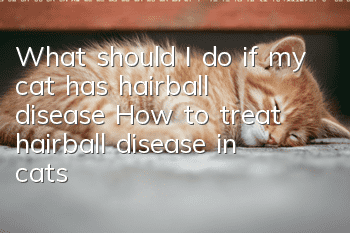Can cats suffer from asthma like people?

Asthma is a long-term inflammatory disease of the lung airways.
This is quite common in humans, but we often overlook that cats have this condition as well. The condition is caused by a combination of genetic and environmental factors, and the clinical manifestations are very similar to the human disease.
But sometimes, it is difficult to determine whether a cat has asthma. This lesson will briefly talk about this topic.
01. Background information
Asthma is a chronic inflammatory disease of the airways of the lungs.
Long-term inflammation of the airway conduction zone increases the contractility of the surrounding smooth muscle and narrows the airway, leading to frequent (but reversible) airflow obstruction and bronchospasm.
During an asthma attack, the walls of a cat's airways thicken and shrink, disrupting breathing. Affected cats' lungs can also expel mucus into the airways, causing coughing and wheezing.
Many cats may have a mild but persistent cough.
02. Causes of asthma
Asthma is usually the result of a combination of genetic and environmental factors.
For cats, the genetic mechanism of asthma has not yet been fully understood.
In humans, it was previously found that if one identical twin is affected, there is a 25% chance that the other will be affected as well (Douglas et al, 2010)
As of 2005, 25 different genes have been found to be related to human asthma (Ober et al, 2006)
In cats, the most recognized cause of asthma is allergic bronchitis. This occurs when a cat's lungs become inflamed from inhaled allergens, leading to chronic inflammation.
The cat's health, stress, obesity or parasites can all affect the asthma response. Although the genetic background of feline asthma is unknown, it has been noted that some cats are at higher risk for developing asthma.
According to a report from the well-known website Pets WebMD, cats aged 2 to 8 years old are more likely to suffer from this disease.
In addition, female cats, Siamese cats and Himalayan cats are also at a relatively higher risk.
03. Symptoms and diagnosis
Symptoms of feline asthma include: coughing and wheezing, crouching and hunching of shoulders when breathing (when the cat is panting), gagging (due to excess mucus, vomiting may occur), breathing with the mouth open, weakness, lethargy, Blue lips and gums.
During an asthma attackSymptoms are more obvious, but some cats with milder cases may show only subtle signs.
If you notice any of the above symptoms, be sure to report it to your doctor.
Diagnosing asthma in cats can be difficult because the symptoms are similar to those of certain other illnesses, such as heartworms, pneumonia, and even heart failure.
Veterinarians typically perform radiographic analysis, blood tests, parasite testing, and analysis of bronchial secretions to make a diagnosis.
04. Treatment and prognosis
Just like humans, asthma cannot be cured, but it can be controlled.
There are different treatments that can help open the airways and reduce breathing and inflammation. Your veterinarian will prescribe medication, which can be used with an inhaler, just like in humans.
Because feline asthma is related to different environmental factors, there are things you can do to prevent your cat from developing asthma and reduce the chance of an asthma attack.
These measures include: regular testing for parasites, reducing environmental stress, and controlling allergens (avoiding the use of perfumes, room fresheners, etc.)
Avoid dusty cat litter, make sure the air is not too dry, make sure your cat has a healthy, balanced diet, and keeps his weight within a healthy range.
Reference materials
1. Elward, Graham Douglas, Kurtis S. (2010). Asthma. London: Manson Pub. pp. 27–29. ISBN 978-1-84076-513-7. Archived from the original on 2016-05-17.2. Ober C, Hoffjan S (2006). “Asthma genetics 2006: the long and winding road to gene discovery”. Genes Immun. 7 (2): 95–100. doi:10.1038/sj.gene.6364284. PMID 16395390.
- Does a cat want its owner to accompany it before it dies?
- Cat vomited and stopped eating after changing cat food
- How to quickly make a cat trust its new owner
- The cat suddenly convulsed and ran around
- Does a female cat meow when she's in heat?
- Why are the ears of a 2-month-old kitten dirty?
- Why do cats pee randomly? How to correct this habit?
- Why do cats purr?
- How to prevent toxoplasmosis in tabby cats, toxoplasmosis in dogs and cats and their prevention!
- What does it mean when a cat licks another cat?



